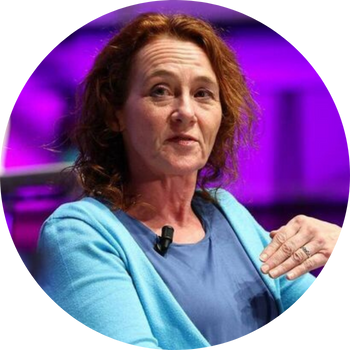
Siobhan O'Donovan
'The Booby Physio' & founder of PostureFitting
Founder of PostureFitting, Siobhán O’Donovan, aka ‘The Booby Physio’, is a chartered physiotherapist specialising in musculoskeletal physiotherapy, particularly in sport and exercise injury prevention and management. After having had what she now knows was not the experience of most women with an expert bra-fitting, Siobhán discovered first hand the immediate and lasting effect it had on her posture and self-confidence. She immediately identified this as an opportunity to use an optimally fitted bra to enhance postural improvements for her patients. This epiphany led to the evolution of PostureFitting and subsequently the Gals against Gravity workshop. By providing her posture & breast weight management system, Siobhán saw the life-changing moments her patients experienced during their PostureFitting consultation and, importantly, the long term benefits it brought to their general health and wellbeing.
“Bits & B👀bs & Bumps & Babies“
Sunday Sep 21st: Main Theatre
09:00 – 09:40
Join us for a journey into the breast health world with The B👀by Physio, supported 😉 by fellow physios & proud Devonians Helena & Kate! Our pun-filled mission is to help you better understand how breasts can impact the bodies of those who bear their load – for a load it truly is. Imagine walking around with a couple of dumbbells strapped to your chest – that won’t be long literally wearing you down, with gravity winning and pulling you downwards and forwards, unless you have the equivalent neuromuscular capacity to resist it. The females amongst you deal with this load everyday, often unknowingly.
Breast weight changes at different life stages & with different events, though this is often not recognized or appreciated. We want to change that for you today by enlightening you on the impact of breast weight on the body, and in particular on the pelvic floor and during pregnancy and in the post-partum period.
Three key principles you’ll take away:
✨ The impact of breast weight on health and wellbeing needs to be recognized, considered and signposting provided as needed, especially but not limited to those in the health and activity fields.
🍲 Poorly supported breast weight is more than just a physical issue, also having significant psychological and social sequelae.
💛 Breast weight impacts and has consequences regardless of breast size, and are not only limited to those who are larger breasted!
“WomenKind Collective Panel”
Sunday Sep 21st: Main Theatre
9:45 – 10:25
From Stigma to Strength: Breaking Taboos and Building Collaborative Care in Women’s Health. Women’s health remains surrounded by silence and stigma. From the menstrual cycle and menopause to pelvic and gynaecological health, breasts, hormones, and neurodivergence, these topics are often avoided, trivialised, or misunderstood, sometimes by clinicians themselves. This can lead to delayed diagnoses, mismanagement, and women who feel unseen or dismissed.
In this panel, Jinty Sheerin & Lou Hockings-Thompson, hosts of Womenkind Collective Spill The Tea Podcast, will be joined by Michelle Lyons, Women’s Health Physiotherapist & Founder of Celebrate Muliebrity, and Siobhan O’Donovan ‘The Booby Physio’ & founder of PostureFitting, to explore how language, bias, and cultural taboos shape women’s health experiences — and how clinicians can play a pivotal role in reframing these narratives. Drawing on expertise in physiotherapy, posture and body confidence, pelvic health, menopause, and neurodivergence, our speakers will highlight how we can move from stigma to strength by naming what is often left unsaid, joining the dots across disciplines, and building more inclusive, collaborative care.
Three key principles you’ll take away:
✨ Name it to normalise it: Learn how the language we use (or avoid) shapes stigma, and how using correct anatomical terms and open questions can create safer, more empowering conversations in clinic.
🍲 Step back and join the dots: Discover how recognising connections across the menstrual cycle, posture, pelvic health, hormones, and neurodivergence can help therapists move beyond symptoms and support whole-person care.
💛 Challenge your biases: Reflect on your own assumptions around gender, weight, hormones, or “typical” patient presentations — and explore practical ways to foster collaboration across disciplines for better outcomes.

